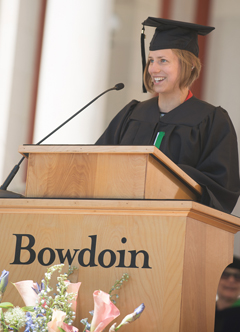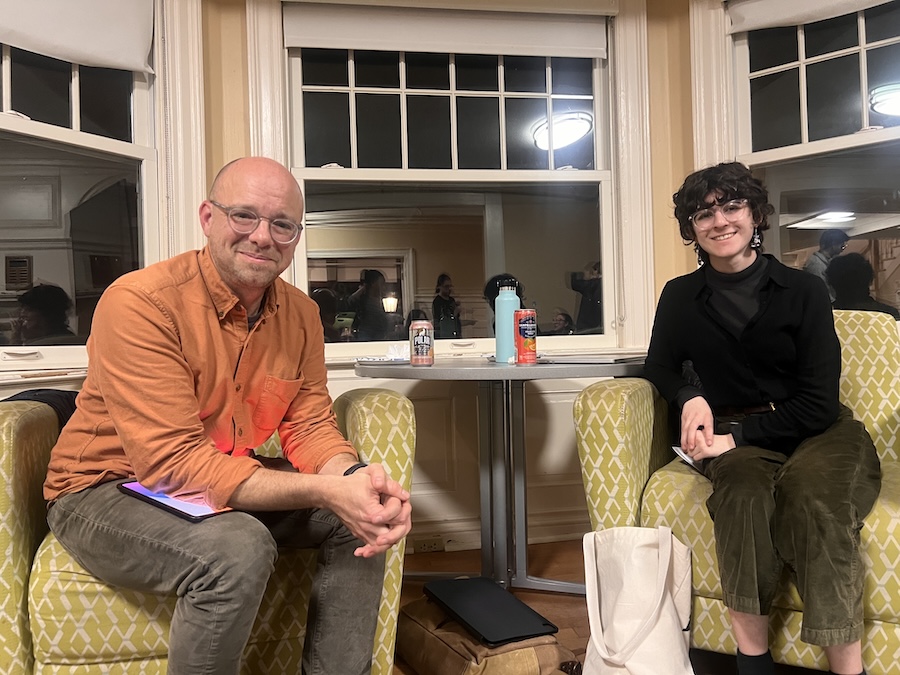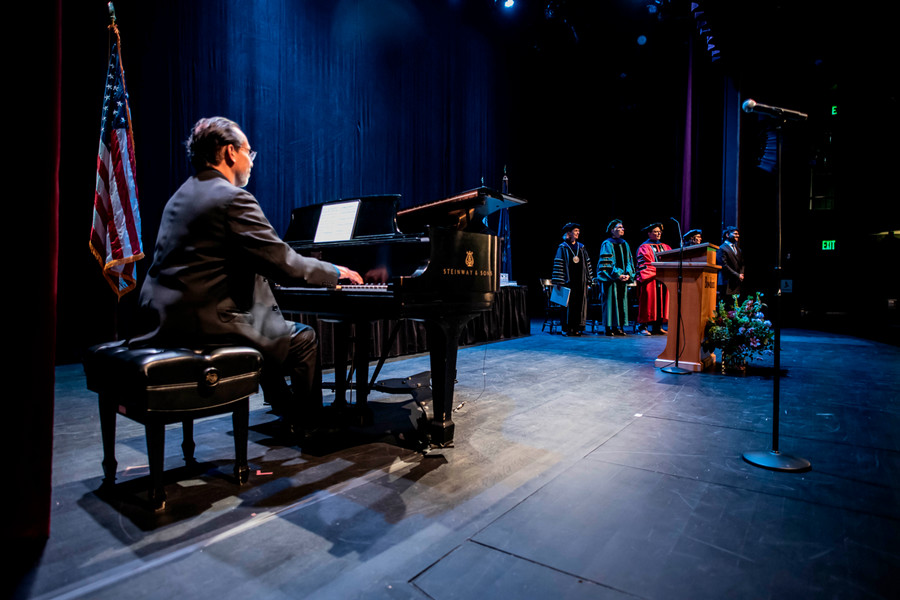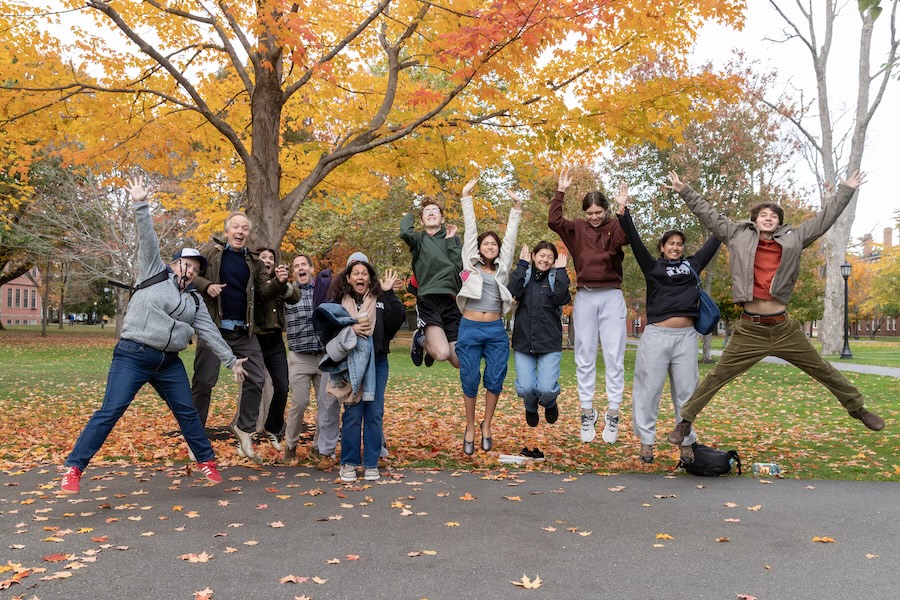Commencement 2015 Student Address: Stevie Lane ’15 Ponders What’s ‘Ahead of You’
By Bowdoin
President Mills, Members of the College, and Guests— I am delighted and honored that I have been granted the opportunity to share a story with you today.
When I see the email, the first thing I do is call my mom. “Don’t worry, honey,” she says. “You have your whole life ahead of you.”
It’s spring break, and I’ve just received disappointing news regarding a post-graduate fellowship for which I had applied. I’m a bit disheartened, and— okay, I’ll admit— wallowing in just a little self-pity. And I’m becoming all-too-friendly with that sense of combined pressure and panic that comes with uncertainty about the future. What am I going to do after graduation? I wonder. And I’m not the only one. My grandparents wonder. My professors wonder. My parents’ friends wonder, even if just to make awkward conversation. What am I going to do next year?
Well, I don’t know about next year, but I know about right now. I’m home alone on a Thursday, reading the “we regret to inform you” email, and I’m going to call my mom.
She answers, and it’s a relief just to hear her voice. I tell her the news, and being the eternal source of optimism and support that she always has been— (thank you, mom, by the way)— she tries to cheer me up. And she tries to cheer me up with a lot of nonsense sort of sentences, sentences like: “You won the fellowship in my mind, sweetie.” Which would be great, if somehow her mind were either the selections committee or happened to have an extra $30,000 dollars lying around. Alas, neither is the case, though I appreciate the sentiment.
Pre-Commencement Thoughts, by This Year’s Student Speakers from Bowdoin College on Vimeo.
But then she says something else: “Don’t worry, honey. You have your whole life ahead of you.”
And immediately I start to worry. I know what she means, of course. Here we are, graduating, and we can do anything. Bowdoin has taught us the most important lesson there is, which is how to learn. For the past four years, we’ve learned to worship our curiosity, notice and exploit opportunities to grow our knowledge. Above what each of our individual diplomas says, we are graduating with a degree in critical thinking and intellectual open-mindedness. And now it’s time to take these skills and see what they mean outside of Bowdoin. Naturally, when we’re about to enter into the world and not-so-willingly surrender the 19-Meal Plan, we imagine that everything up and to this point has just been preparation for this moment— this moment when we will emerge from our intellectual adolescence and enter upon what is and will become our “real lives.” This is it. We have, now, our whole lives ahead of us.
But when my mom says it to me— “Don’t worry, honey. You have your whole life ahead of you”— I panic. Because that statement, which I’ve heard so many times as I’ve approached this juncture, is simply not true. We’re twenty-some-odd years old, which, given national averages, is about a quarter of our lives. Sorry— I know that may be a pessimistic way of looking at it, but it’s the truth. The glass may not be half-empty, but it’s really only seventy-five percent full. So my mom is lying. And in fact, the only person who could have said that to me in truth was the doctor who delivered me one cold January night at NewYork-Presbyterian. “Stevie,” he could have said, “You have your whole life ahead of you.” And just for that second, he would have been right.
So when does that stop? Have you ever wondered? When do people stop telling you that you have your whole life ahead of you? Is it marked by a certain age or birthday? I mean, is that what thirty is going to be? Or, is it a life event? Like after your first child or your third marriage? You know, you never hear: “Stevie, you have most of your life ahead of you!” or “Stevie, you have, well, I guess like, maybe half of your life ahead of you!” or— from my doctor, sometime probably one-hundred and thirteen years from now or so: “Stevie, you have almost none of your life ahead of you! What are you doing? Take your pills!” When does it stop?
I don’t have the answer. But I have a theory that I’d like to share.
Maybe it doesn’t depend on age or lifespan or any significant life event at all. Instead, maybe it depends on our attitude about our lives. The thing about that saying is that it implies that everything is still to come; that the best parts of our lives are still before us. So long as I continue to believe that, and continue to pursue the future I envision for myself, my whole life lies ahead of me, waiting. The moment I stop appreciating that I still have more to learn and to experience— stop treasuring that love of exploration, growth, and intellectual wonder which Bowdoin has taught me— that is the moment I forfeit the proverbial “whole life ahead of me” and my right to the optimistic outlook which that saying represents.
And I’m guessing it won’t always be easy. There will be times when I fail and imagine that things will never get better, I’m sure. There are plenty of other fellowships out there for me to not receive. I will have regrets— regrets that are much, much more serious than losing my OneCard on the weekend when the office is closed. I will have to resist the temptation of nostalgia, which will try to con me into believing that yesterday was sunnier than today. I will have to espouse one of the most entrenched myths surrounding the college experience: that these four years have been the best of my life. Given that I’m standing here at graduation about to leave this place, I really kind of hope that isn’t true. But there will be days when I’ll believe it.
In addition to being selected as one of the commencement speakers, Lane also received the English Sinkinson Short Story Prize, the Government and Legal Studies Department Prize for Excellence in Political Theory, and the Government Philo Sherman Bennett Prize.
Lane is from Dobbs Ferry, New York. A political philosophy major with a minor in English, she was a staff member for the Quill literary magazine and an op-ed contributor to The Bowdoin Orient, and she co-hosted a radio show on WBOR.
She is a Sarah and James Bowdoin Scholar, and she was the recipient of the Forbes Pickard Jr. Memorial Prize for poetry in 2012 and the Hawthorne Prize for the best short story in 2014.
She was a co-leader of Book Buddies, a service program that works with local students for whom English is not their native language, helping to increase their proficiency, and a research assistant in the Department of Government and Legal Studies. She has also been an active, rock-climbing member of the BOC, an accomplished metalworker and silversmith, and she was a Bowdoin pole-vaulter for three years.
In her junior year, Stevie studied political science and Turkish in Istanbul. This year, she completed two independent studies —one in wire sculpture and one in creative short fiction writing — and her honors thesis was on the political philosophy of French-Algerian novelist Albert Camus.
Stevie’s immediate plans are to take some time to travel with her mom, which she will do in a few days. After that, her long-term plans include graduate school.
And that all seems right to me, and even good. Because, as Bowdoin has shown me, every instance of failure, every uncertainty, every “I don’t know,” and every present moment is an opportunity to learn. There will always be people more qualified, smarter, even luckier. And there will always be disappointments. But, I think, if we remain open to that, and remember that these can be transformed into occasions to pause and reconsider what comes next, then we can reclaim our sense of control and enthusiasm about the future. If we decide that what we will do is just as important and exhilarating as what we’ve already done, if not more so, then our failures become manageable and our future glows always brighter. And that is a wondrous and powerful thing.
I hope I can see my life this way. I hope I always imagine that my best years are still to come, even when I’m one hundred and thirty-five, running down the hospital hallway away from my doctor and my pills. I hope I can understand setbacks to be nothing more than steps on the way to each subsequent adventure. I’ll try to imagine my life not as a hill— with a climb, peak, and decent— but as a constant, indefatigable crescendo. And I wish the same for all of you.
Congratulations, Class of 2015. I don’t know what the future has in store for you, or what you will do, but I know that it will be rich and exciting; difficult and wonderful. After all, we do still have a pretty significant portion of our lives ahead of us. Thank you.



